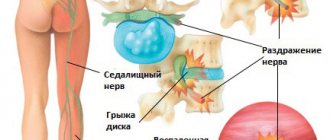A tingling sensation throughout the body is a sign of many vascular and neurological diseases. This is how endocrine pathologies can manifest themselves, for example, diabetes mellitus in an advanced stage, thyrotoxicosis, excess adrenal hormones, etc.
If you periodically experience tingling throughout your body like needles, we recommend that you consult a neurologist. With a high degree of probability, a malfunction in the autonomic nervous system will be detected. Then it will be necessary to identify the cause of such a disorder - what kind of disease led to damage to the structure of the nerve fiber. After making an accurate diagnosis, the doctor will be able to develop an effective and safe course of therapy.
It is very difficult to independently identify the cause of such a symptom, since the anatomy and physiology of the autonomic and central nervous systems are quite confusing and incomprehensible to a person without a medical education. Here are just some information that will help to better understand the mechanism of pathological manifestations:
- in the structures of the brain there are centers that analyze impulses coming from different parts of the body;
- The senses (touch, smell, vision, hearing, taste) are responsible for collecting information about the environment;
- the transmission of signals from the sense organs occurs through sensory types of axons; they enter the structure of the radicular nerve, which transmits the signal through the spinal cord and the surrounding cerebrospinal fluid to the cerebral centers;
- back through the spinal cord and radicular nerves, a response impulse passes through the motor (motor) network of nerve fibers, which commands the muscles to contract or unclench;
- in this way the work of the vascular bed, the entire muscular framework of the body, internal organs, the process of breathing and heartbeat is coordinated;
- even the secretion of gastric juice occurs in a similar way after the passage of a signal from the gastric mucosa about the arrival of a food bolus;
- with pathological changes in small sensory nerve endings located in the middle and deep layers of the skin, a person feels a tingling sensation (thus the autonomic nervous system signals about problems and pathological processes).
If you have tingling skin all over your body, you need to see a neurologist as soon as possible. Only a doctor, with the help of special examinations, can identify the exact cause of such a neurological symptom related to paresthesia.
Of course, cases of physiological tingling are possible. But, as a rule, it occurs in limited areas of the body. For example, if a person was in a forced uncomfortable position for a long time, in which his blood microcirculation processes were disrupted. Against the background of oxygen starvation, small nerve endings suffer from ischemia and give a tingling effect. Thus, the body signals about pathological changes that require immediate help. After changing the position of the body, all unpleasant sensations disappear within a few minutes, as soon as adequate nutrition of the nerve fiber is restored.
If tingling sensations are present simultaneously throughout the entire body, this may indicate that the pathology is developing in the structures of the brain or spinal cord. If the patient is not provided with timely medical care, brain damage or paralysis of the entire body may develop. There is also a high probability of death due to respiratory or cardiac arrest.
If you have tingling sensations in your body and you are in Moscow, you can make an appointment with a neurologist right now. In our manual therapy clinic, the initial appointment with a neurologist is completely free for all patients. During the consultation, the doctor conducts an examination and establishes a diagnosis, giving individual recommendations for further examination and treatment.
You can make an appointment for a free appointment with a neurologist using the special form located at the bottom of this page. You can also call the number provided and agree with the administrator on a convenient time for your visit.
What does tingling all over the body mean?
First, let's look at the question of what tingling throughout the body means and what this sensation indicates. So, tingling is a subjective sensation that is not manifested externally in any way. It may be accompanied by pale skin, goose bumps, or may remain without external manifestations. It all depends on the reason for the appearance of such a clinical sign.
As mentioned above, small sensory and motor nerve endings are present literally throughout the body. They penetrate all layers of skin, muscles, ligaments, tendons. Each nerve ending is connected to a small blood vessel (capillary). It provides uninterrupted nutrition to the nerve fiber.
If the blood supply is disrupted for one reason or another, a tingling sensation occurs, then aching. If emergency measures are not taken, the nerve fiber begins to die and the tingling sensation is replaced by numbness.
What does tingling throughout the body mean - this is a reaction of the autonomic nervous system in response to a violation of the blood supply or innervation. This condition can occur with various pathologies at the level of the brain and spinal cord, spinal column, nerve plexuses, radicular nerves, large, medium and small nerves responsible for the innervation of the body.
Tingling sensations throughout the body can occur against the background of poisoning, disruption of the endocrine system, and even with the development of acute viral or bacterial infections. We will analyze all possible reasons in more detail later in the article.
Who should I contact?
A neurologist is involved in the diagnosis and treatment of neurological disorders, such as sensory loss and numbness in the extremities. In order to correctly assume what was the possible cause and choose the right direction of the diagnostic search, the neurologist must examine the patient, find out in which parts of the body numbness occurs (only in the fingers, in the hands or feet, in the entire arm or leg, in one limb , or right and left symmetrically), are there any other neurological symptoms or concomitant diseases.
Depending on the results of the examination, the neurologist may refer you to other specialists:
- For vasculitis, Raynaud's disease - see a rheumatologist.
- For cardiovascular pathologies, see a cardiologist.
- For diabetes mellitus, see an endocrinologist.
- In case of tumors or injuries, see a neurosurgeon.
- For infectious diseases - see an infectious disease specialist.
- In case of poisoning with harmful substances at work, contact an occupational pathologist.
Reasons why tingling throughout the body
Why is there tingling all over the body? This question can only be answered by conducting a full examination of the patient. Based on additional clinical signs, an experienced neurologist will be able to exclude the possibility of a vascular accident, disruption of the passage of nerve impulses along the spinal cord, etc.
The main causes of tingling throughout the body include the following diseases and conditions:
- iron deficiency or B12 deficiency anemia - with an insufficient number of red blood cells, the body's cells experience oxygen starvation, which manifests itself in the form of unpleasant sensations;
- deficiency of certain minerals, for example, magnesium, leads to defective transmission of nerve impulses through a network of small nerve endings;
- insufficient amount of B vitamins - the function of the nerve fiber is impaired, it undergoes partial atrophy;
- spinal cord stenosis occurs (for example, when a dorsal hernia prolapses into the lumen of the spinal canal or when the vertebral bodies are displaced against the background of intervertebral disc protrusion);
- the blood supply to cerebral structures is disrupted (for example, with the development of posterior vertebral artery syndrome against the background of long-term osteochondrosis of the cervical spine);
- foci of ischemia develop in the structures of the brain against the background of atherosclerosis and other vascular pathologies;
- there is an emergency increase in blood pressure;
- A large amount of adrenaline, norepinephrine, cortisol and other stress hormones are released into the blood;
- Diabetic angiopathy and neuropathy develop against the background of a constant increase in blood sugar levels in uncontrolled diabetes mellitus.
There are several other possible causes of tingling throughout the body, like needles, and among them it is worth highlighting tumors, infections of the spinal cord and brain. Sometimes potential causes of tingling skin throughout the body are traumatic lesions of the structures of the spinal column. The risk group includes older people with developing osteoporosis. In them, even minor injuries can lead to a compression fracture of the vertebral column. This injury often causes the development of various neurological manifestations, including paresthesia throughout the body.
Only an experienced neurologist can determine exactly what causes tingling throughout the body. He may prescribe an EEG, MRI of the cervical spine and head, ultrasound of the vessels of the neck and head, X-rays, etc. Based on the results of all examinations, the doctor will make a diagnosis and prescribe adequate treatment. It is not recommended to take measures to combat this symptom on your own. This can lead to tragic consequences.
Numbness from compression of nerves and nerve roots
One of the most common conditions that leads to compression of the nerve roots is intervertebral hernia. Most often it forms in the lumbar spine, as it experiences the heaviest loads. Fortunately, in most cases, if you consult a doctor in a timely manner, intervertebral hernias can be treated without surgery.
Carpal tunnel syndrome leads to numbness, tingling in the hand and other symptoms. In the wrist area there is a tunnel formed by bones and ligaments. It contains a nerve that, under certain conditions, can be compressed.
In the area of the shoulder girdle and collarbone is the brachial nerve plexus - all the main nerves innervating the arm depart from it. During injuries (most often road accidents), these nerves are stretched and compressed, resulting in numbness and, in severe cases, paralysis of the arm.
With spondylolisthesis, the upper vertebra “slips” a little from the lower one, this leads to compression of the spinal cord and nerve roots, and sensitivity disorders.
A slight tingling sensation throughout the body is a symptom of the disease.
Symptoms such as tingling throughout the body are classified as neurological. They indicate a disturbance in the conduction of a nerve impulse or incorrect processing of received information by brain structures. If such clinical signs appear, an urgent consultation with a neurologist is necessary.
Minor tingling throughout the body may be present during intoxication. In this case, toxins and tissue breakdown products enter the nerve endings along with the arterial blood flow. They negatively affect the nerve endings and the person feels an unpleasant tingling sensation throughout the body; when it appears against the background of elevated body temperature, measures should be taken to detoxify the body.
Also, tingling can be a symptom of damage to brain structures due to circulatory problems. With the development of ischemic stroke at an early stage, a volatile tingling sensation may occur in one half of the body. If, along with them, even a slight decrease in muscle strength is felt, a dilated pupil appears in one eye, or a violation of the symmetry of the facial muscles occurs, you should immediately seek medical help. In case of a stroke at an early stage, it is possible to provide emergency conservative care, after which the patient will not develop paralysis.
Manifestations of tingling, burning, numbness sensations
Along with these sensations, as a rule, other symptoms associated with a disorder of higher nervous activity may appear, such as decreased mood, sleep disturbance, causeless anxiety, internal trembling, as well as the following:
Often accompanying symptoms of numbness, burning, tingling
- Heart pain, palpitations, chest pain, chest pain.
- Psychosomatic disorders.
- Muscle pain. Muscle pain (“twists”).
- Lower back pain, heaviness in the lower back or back.
- Headaches of various types and intensity.
- Heaviness in the body. Heaviness in the limbs.
- Feelings of heat or chills. Attacks or “hot flashes” of heat, chills.
- Feeling of a lump in the throat. Difficulty swallowing, choking.
- Nausea, stomach pain, gastrointestinal disorders.
- Feeling of weakness, emptiness, fatigue.
- Dizziness. Impotence.
Causes of feelings of numbness, burning, tingling
Feelings of numbness, burning, tingling in various parts of the body, which can be due to various reasons.
For example:
- if a person has been in the same position for a long time, any part of the body may become numb,
- the situation can occur after long periods of heavy, tiring physical activity,
- if there is a lack of any microelements,
- may be an indicator of various vascular diseases,
- numbness, burning, tingling in various parts of the body can be associated with serious diseases caused by organic lesions of the central nervous system (for example, polyneuropathy is a fairly common disease in severe forms of alcohol addiction); - the most common sensations of numbness, burning, tingling manifests itself in various borderline mental states and are included in such syndromes as: neuroses, anxiety disorders, depression, etc.
Treatment of nerve tingling throughout the body
Nervous tingling throughout the body is not an independent disease. This is a clinical symptom of various pathological changes in the human body. Therefore, treatment can begin only after an accurate diagnosis has been made. During the examination and examination, the doctor establishes the diagnosis and the reasons that led to the development of a particular disease. Then the patient is given individual recommendations. These may include:
- changing your diet to include all the necessary nutrients, minerals and vitamins;
- maintaining an active lifestyle with sufficient physical activity, since paresthesia can appear against the background of advanced cases of physical inactivity;
- proper organization of sleeping and working space;
- giving up bad habits, etc.
In our chiropractic clinic, severe tingling sensations throughout the body are treated only after a diagnosis has been made. If they are provoked by a dorsal intervertebral hernia, then measures are first taken to reduce the hernial protrusion of the nucleus pulposus and restore the integrity of the cartilaginous tissue of the intervertebral disc. Osteopathy and laser vaporization can be used for this. Then several sessions of manual traction of the spinal column are performed. The doctor may also prescribe massage, physiotherapy, therapeutic exercises, kinesiotherapy, reflexology, etc.
The course of treatment is always developed individually. Therefore, we recommend that you make an appointment for a free appointment with a neurologist at our manual therapy clinic. During the consultation, you will be given individual recommendations for examination and treatment.
Examination for numbness of extremities
- Depending on the suspected cause of numbness in the limbs, the doctor may prescribe different types of diagnostics. X-rays help diagnose diseases associated with disorders of the skull and spine, such as intervertebral hernia. If there is a suspicion of vascular pathology, angiography is performed - an X-ray examination with the introduction of a contrast solution into the vessels.
- If necessary, you may be prescribed other imaging methods: ultrasound, CT, MRI.
- In order to check in which nerves the conduction of impulses is impaired, electroneuromyography is used - a study using special electrodes.
- Sometimes they resort to the method of evoked potentials. Special sensors are placed on the patient's head to record brain activity. The affected nerve is stimulated through the skin using electrical impulses and the brain is observed to respond to the stimulation.
Since dozens of different reasons can lead to numbness in the arms and legs, the diagnostic program must be individual for each patient. In some pathologies, if left untreated for a long time, even more serious, irreversible neurological disorders may occur. Visit a neurologist, make an appointment by phone: +7 (495) 120-08-07
Diagnostics
Clinical symptoms are of great importance for making a diagnosis. Therefore, the doctor carefully asks the patient about when the disease began, how it manifests itself, and what helps.
Table 2. Differential diagnosis of numbness and tingling in the extremities. Possible reasons
| Affected limbs | Localization, features of numbness | Presumable disease |
| Upper | Sudden lesion of one arm. | Intervertebral disc herniation, spondylosis, osteochondrosis, plexitis, tunnel syndrome |
| Combined with impaired active movements. | Polyneuropathy, plexitis, tunnel syndrome. | |
| Symmetry. | Intoxication, infection. | |
| Blueness of fingers. | Raynaud's disease. | |
| Affects all fingers except the little finger | Carpal tunnel syndrome. | |
| Paresthesia of the little finger | Ulnar nerve neuritis, ischemic heart disease | |
| Lower | The pathological process affects the legs and lower back. | Osteochondrosis, lumbar hernia, atherosclerosis, pinched sciatic nerve, cauda equina syndrome. |
| Combined with impaired active movements. | Arthritis, multiple sclerosis, carpal tunnel syndrome, polyneuropathy, stroke. | |
| Damage to the lower leg and foot in combination with pain and muscle tension. | Thrombophlebitis, neuropathy, varicose veins. | |
| Paresthesia of the toes. | Arthritis of the thumb, radiculoneuritis, neoplasm, polyneuropathy. | |
| Top and bottom | Numbness of the left or right limbs | There may be several reasons: stroke, brain tumor, multiple sclerosis, transient ischemic attack. |









